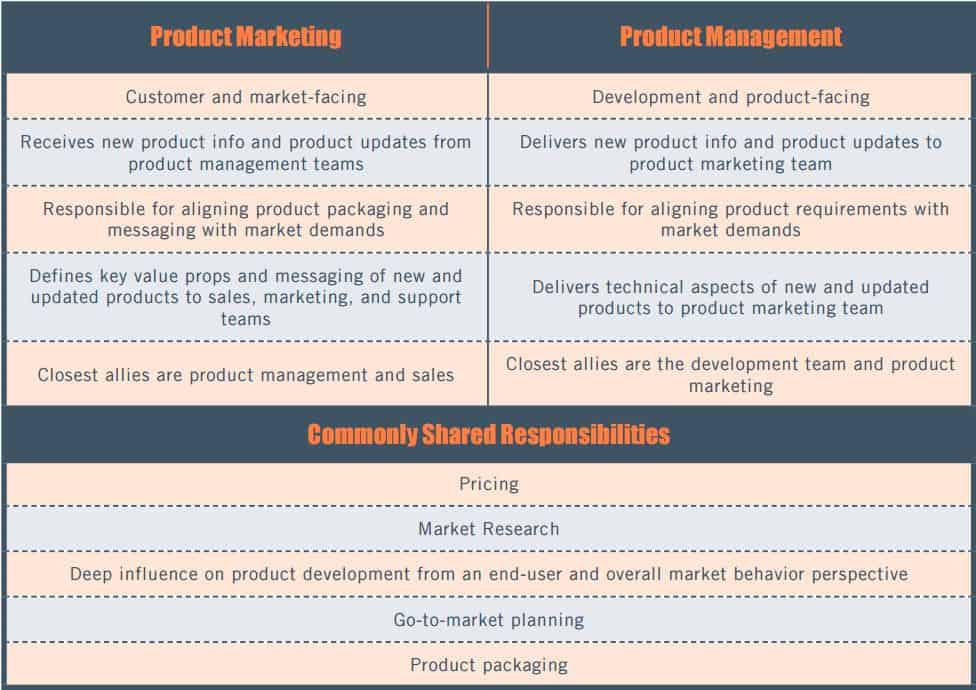Wondering what the differences are between product marketing and product management? Chances are that you’re not alone. For instance, if you look at job descriptions at tech companies, you’ll notice that roles and responsibilities often intersect. Not to mention, “required” skill sets often lack consistency—some product manager roles require technical backgrounds while others don’t. So what’s the deal?
Having gone through many years of reading job boards, consulting for product marketing teams at tech companies, working with product managers, and working on business education programs for these two roles, I put together a definitive guide with some clarity. Whether you’re looking for a job or seeking to hire a new team member, here’s what you need to know about these two roles:
Core Responsibilities
You can think of product marketing as a type of glue for the organization. Product marketing leaders are responsible for communication, product positioning, and growth. Once a product is built, this individual communicates its value to the market at large, coming up with new ways to reach and engage target audiences.

Product managers, on the other hand, are responsible for coordinating the teams that build the product. These individuals work cross-functionally too, actively sourcing feedback from customers and translating this information into engineer-friendly instructions. At some companies, product managers will need a strong technical background with hands-on engineering experience—it depends on your product, workflows, and customer base.
Both roles operate as connectors, both internally and externally. Both leaders will interview customers and relay feedback to internal teams. The key differentiators, however, are each person’s areas of focus. A product marketer’s end goal is to bring a product to market that generates new and/or recurring revenue to the business. The product manager ensures that the product going to markets gets built on schedule and responds to market demand.
RELATED CONTENT: The Blueprint to Product Launch Marketing
Performance Benchmarks & Value Adds
To understand the difference between product marketing and product management, start with the success metrics for each role. For product managers, performance KPIs are centered around usage, outages, customer satisfaction, and speed to market with new releases. For product marketers, success depends on growth and retention.
For product managers, performance KPIs are centered around usage, outages, customer satisfaction, and speed to market with new releases. For product marketers, success depends on growth and retention.
As you’ll readily see, all of these success areas intersect and directly influence one another. It’s tough to achieve steady, sustainable growth for a lackluster product—and there’s no point bringing new features to market if there is no growth strategy in place. From day one of any project or initiative, it’s critical that these two roles work closely together as allies, on a level playing field.
Personalities
Product managers and marketers tend to be similar personality-wise—both roles require interpersonal prowess, superior organizational skills, and a great ability to empathize with both customers and colleagues. But there are some key differences to note.
As builders, product managers need strong engineering, managerial, and operational minds. As connectors, product marketers need to be growth-minded. Both roles need a healthy mix of creativity, patience, and influencing skills.
Product managers and marketers also operate in extreme ambiguity and need to be self-directed in defining their own roles and alleviating uncertainty. These individuals need to be acutely aware of their strengths and weaknesses, and must be comfortable with delegation.
Final Thoughts
Product managers and marketers are complementary pieces to a company’s customer success puzzle. In order for marketing to be successful, you need a great product. If you build a great product, you need a marketing plan and the right messaging to inspire growth. Product managers and marketers will have similar personalities—but it’s important to focus on each role’s unique strengths and value adds. Both perspectives count, and are critical to the success of any B2B company.
Get the B2B Play-by-Play
Learn more about how to create a stellar team to optimize your marketing strategies with the B2B Marketing Playbook.


